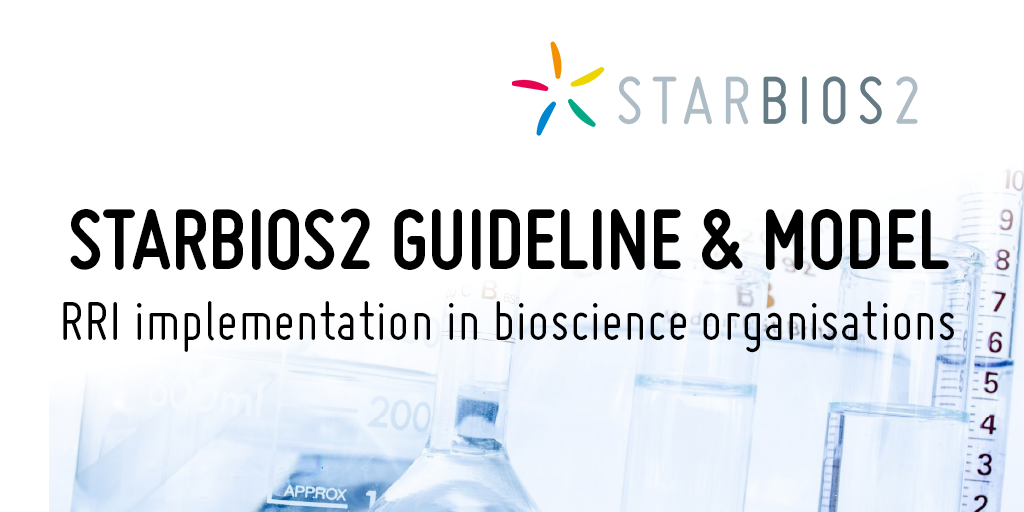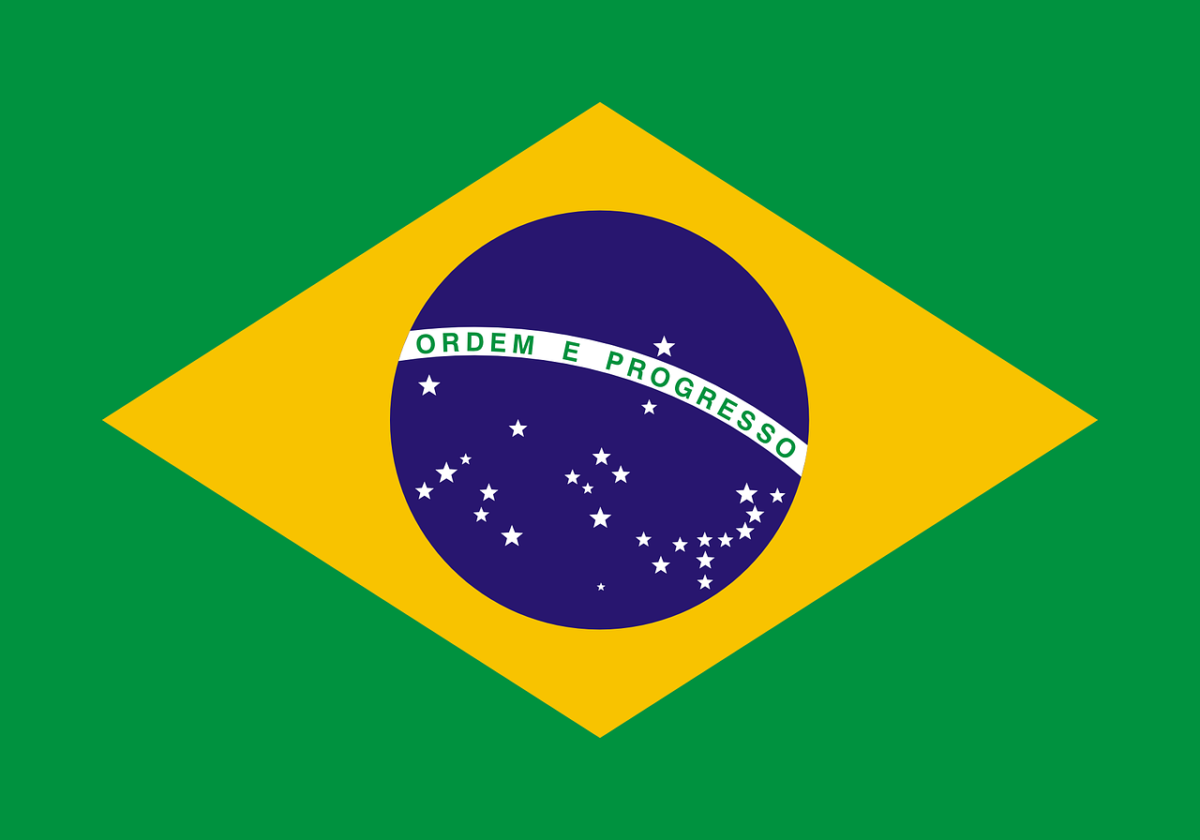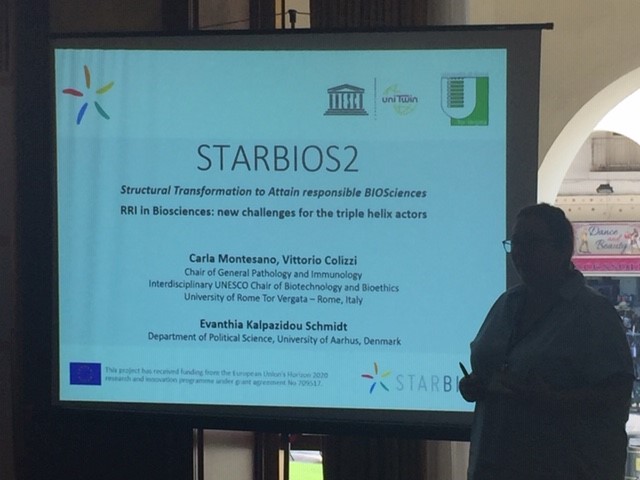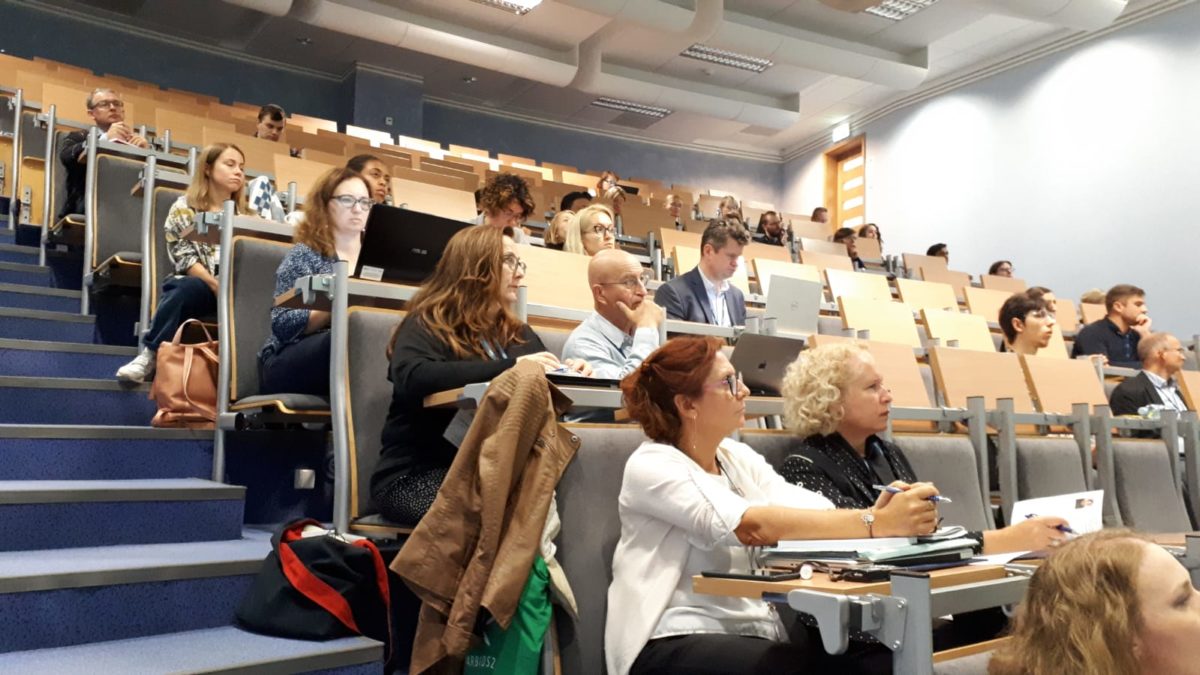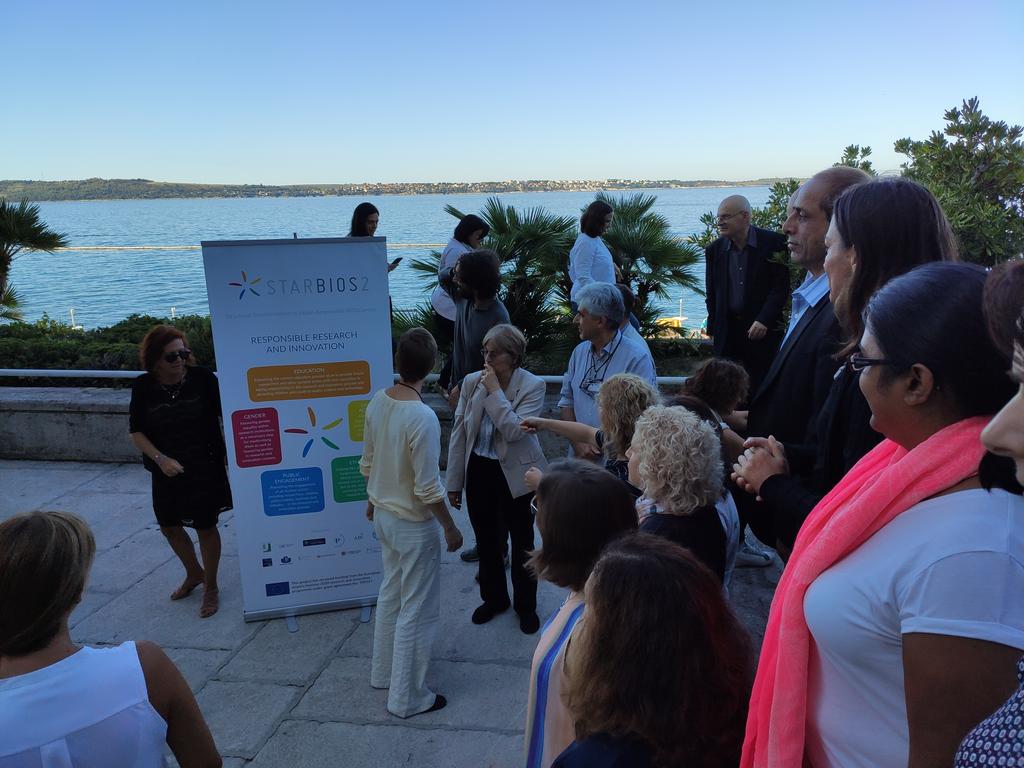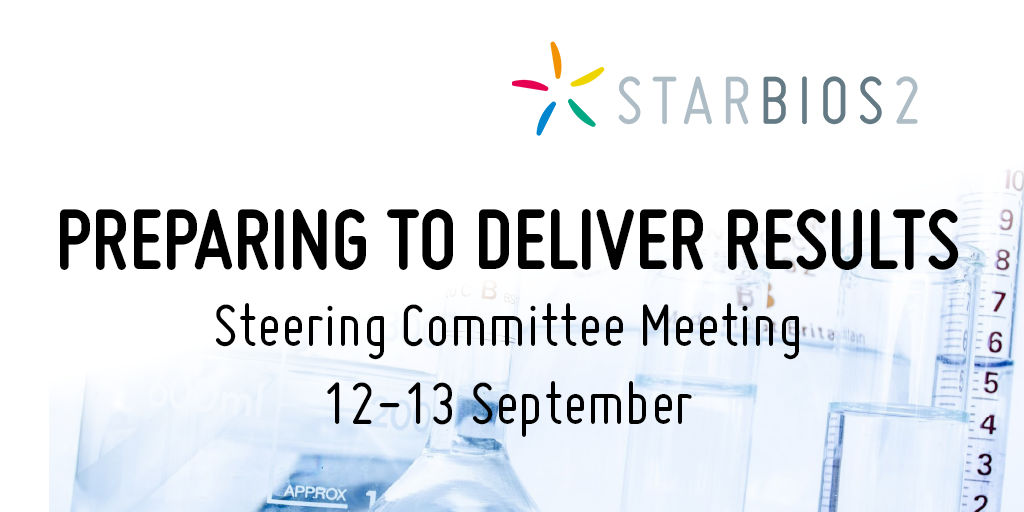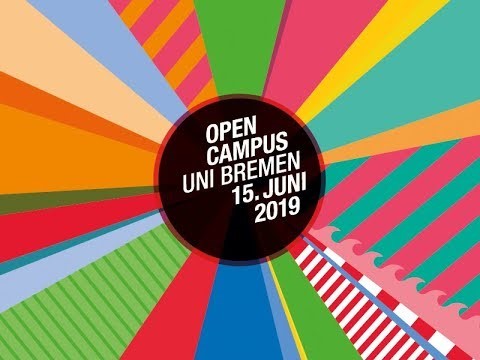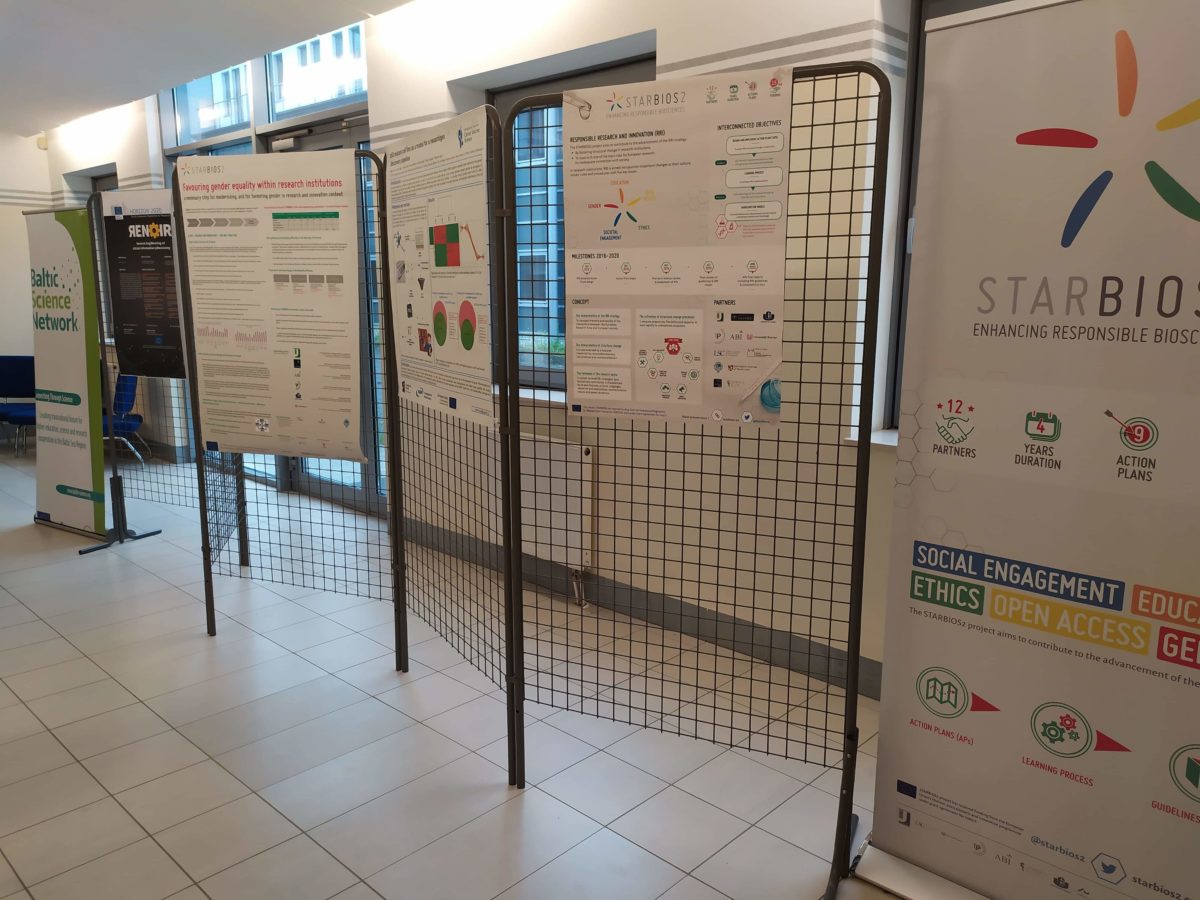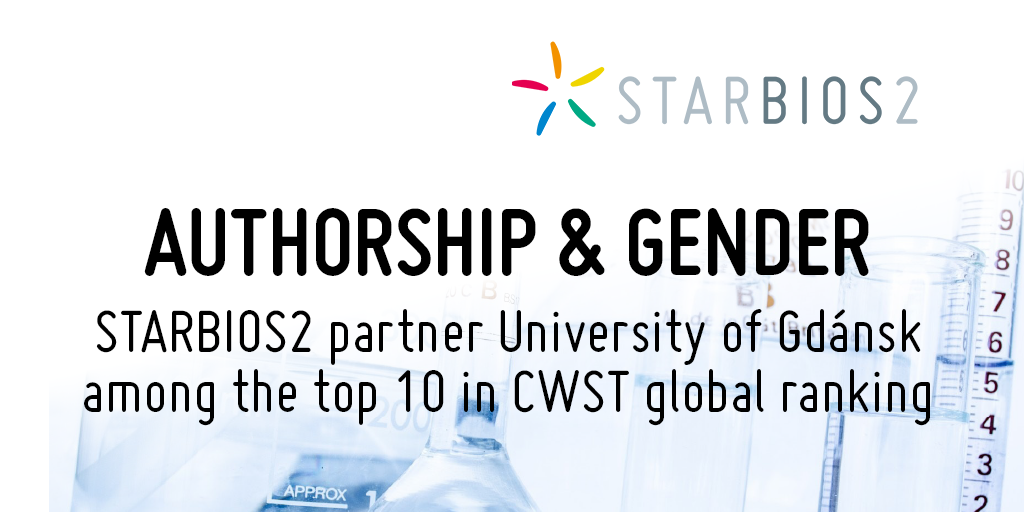The STARBIOS2 project has developed a model and guideline aiming to promote the practice of Responsible Research and Innovation (RRI) in bioscience research organisations. The model was developed through an iterative process: Six European institutions in the bioscience sector have designed and implemented action plans to achieve RRI structural change in their own organisations. The implementation was part of a learning process, where the action plans generated new practical knowledge, that was fed back to amplify the structural change. Through his iterative learning process, STARBIOS2 partners have developed a model that we are now able to share with anyone who is interested in promoting responsible biosciences! The guideline document represents one of the outputs of the STARBIOS2 project. The model builds on work carried out by the University of Rome Tor Vergata (Italy) that coordinated the work, Oxford University (United Kingdom), Agrobioinstitute (Bulgaria), University of Primorska (Slovenia), University of Gdansk (Poland), and University of Bremen (Germany). The teams received technical assistance from The Laboratory of Citizenship Science (Italy) Aarhus University (Denmark), Uppsala University (Sweden). The development of our model also included exchanges with experts outside the consortium, analysis of literature and documentation on similar experiences. The project is now in its final phase, where six non-European partners will use the learnings so far to implement action plans for structural change: Funcacao Oswaldo Cruz in Brazil, the International Centre for Genetic Engineering and Biotechnology (ICGEB) in South Africa, and the University System of Maryland, in the United States of America. Download …
STARBIOS2 in Brazil
Today, 4 November 2019, our STARBIOS2 colleagues in Brazil host the event “Transformações Estruturais para uma Pesquisa Responsável e com Inovação”, which roughly translates to Structural Transformations for Responsible and Innovative Research. At the FIOCRUZ event in Rio de Janeiro, participants will discuss the concept of responsible research and innovation with a new approach to reinforcing the connection between science and society. Focusing on gender equality and societal engagement from a Brazilian perspective. With lessons learned from the STARBIOS2 project, presented by Claudia Colonnello.
Open Science > Open Access to scientific publications
University of Primorska’s TV crew interviewed STARBIOS2’s Elena Buzan, Carla Montesano and Vittorio Colizzi in connection with the STARBIOS2 steering committee meeting in Portoroz, Slovenia. This is what they had to say. This content was first published on the University of Primorska website (in Slovenian). Open science is not only open access to scientific literature, but includes open access to data, methodology, reviews and to educational resources. In the past two decades, the biosciences has advanced and produced discoveries like that have significantly improved our quality of life. But with rapid developments comes public concern. STARBIOS2 is looking to bridge this gap between science and society. To ensure appropriate and ethical societal advancement, well-trained scientists and open science are essential parts to the process. Elena Buzan In the interview, Elena Buzan describes that we are witnessing remarkable development of biological sciences, which is on one hand inspiring, and on the other concerning, as we know that new technologies always pose a certain risk. She continues to say that this enlarges the need for a new generation of scientists and a new responsible approach to open science. This approach involves different stakeholders and, above all, society in research development and decision-making processes. We are developing gene therapies to treat genetic diseases. We are creating and modifying new bacteria and microorganisms to clean environmental pollution. And we are developing different approaches in biology to solve energy problems. These new scientific findings are of utmost importance for the well-being and development of society. …
Connecting science with society at ETHAC2019
Science is connected to society. Without this connection, European research is at risk. Last week, STARBIOS2 coordinator Carla Montesano was at ETHAC2019 alongside our monitor and evaluator Evanthia K. Schmidt talking about how to respond to this challenge. We need to respond! We need to move our research focus and practice from a single living being, to including that being’s environment and the connections between the two. Carla Montesano, STARBIOS2 coordinator Focus is shifting from the study of a single element towards the study of living being biology in relation to the dynamic environment: the study of the Exposome. The same goes for laboratories. We are moving from small, linear organisations to larger, more dynamic organisations. Now, there is demand for contextualizing bioscience, and focusing on the contribution of various stakeholders into both research and policy practice. “We need to respond! We need to move our research focus and practice from a single living being, to including that being’s environment and the connections between the two. The same goes for our research practices. We cannot operate on small isolated islands anymore. We need Open Science, because we need wider networks that shares ideas, knowledge and resources”, Carla Montesano says. Only an hour left! ⏱ Make sure you catch the @STARBIOS2 session at #ETHAC2019! Learn more about our project and #RRI in #bioscience at https://t.co/cLkuCMuRWE https://t.co/drxLsaYCAc — STARBIOS2 (@STARBIOS2) October 1, 2019
STARBIOS2 at ScanBalt Forum
Last week, STARBIOS2 members were busy at ScanBalt Forum, and this years theme was “Molecular Biology and Immunology of Cancer – R&D perspectives”. Hosted in Gdansk, Poland, partners from University of Gdansk were of course present. But so were consortium members from Italy, from University of Tor Vergata and from Laboratory of Citizen Science. ”Science & society are in a complex transition. Structures, norms, values, and practices are changing. This is affecting bioscience. Under what conditions can RRI be an effective reaction?” Claudia Colonello Claudia Colonello gave a talk titled “Structural Change to Attain Responsible Biosceinces: the experience of the STARBIOS2 project” where she described the complex transition facing the biosciences today. In her presentation, Claudia raised an important question: ”Science & society are in a complex transition. Structures, norms, values, and practices are changing. This is affecting bioscience. Under what conditions can #RRI be an effective reaction?” STARBIOS2 at ScanBalt Forum 2019
Sustainability of structural change at STARBIOS2 meeting in Slovenia
12-13 September 2019, the STARBIOS2 consortium met in Portoroz, Slovenia to discuss how to sustain the structural changes made in during the project. And to figure out how to disseminate and communicate about the guidelines for maximum impact, so that other bioscience research institutions can learn from our experiences. Curious? Have a look at some of the highlights below. STARBIOS2 Steering Committee Meeting in Slovenia
Preparing to deliver results
On September 12-13, the STARBIOS2 consortium steering committee will meet in Slovenia to discuss the guidelines, action plans and how we can make sure our results are shared with both the RRI and bioscience communities. The agenda covers updates on the first six action plans from all implementing partners, and the following three action plans that will be carried out by our partners from Brazil, South Africa and the US. We will discuss how to ensure the project has impact on bioscience research organisations in Europe and elsewhere, plan our final events in Cape Town and Brussels next year. Followed by what, where and how to publish our results to ensure our outputs are available for the scientific community. Follow our discussions on Twitter #STARBIOS2scm.
STARBIOS2 goes to OPEN CAMPUS BREMEN
STARBIOS2 partner University of Bremen invited interested people in their local community to the OPEN CAMPUS on 15 June 2019. In addition to the extensive and varied programme, guest took part in guided tours, a “children’s campus”, concerts and a poetry slam on the outdoor stage. 2000 visitors accepted the invitation. “It was a successful event with many interested participants and a great opportunity to disseminate the concept of responsible research and innovation and the STARBIOS2 project,” says Tanja Barendziak, part of the STARBIOS2 team at OPEN CAMPUS. Under the slogan Open Worlds – Share Knowledge researchers from different faculties, institutes, affiliated institutes and research unites shared fascinating insights into their work and projects. Based on their previous work on “Science for You and Me”, the STARBIOS2 team presented the topic of genetic engineering and the challenges this technology brings. Children’s hands-on activities included DNA isolation from strawberries and construction of DNA models with pearls. Guests interested in learning more took part in a reflective activity on future topics of genetic engineering: “Should mammoths be brought to life?”, “Green genetic engineering as a solution to global hunger?” and “The humanity that no longer ages?” Participants reflected on various key questions (e. g. What problems could this research entail?) and to write their thoughts on ready-made note sheets. Their notes were collected, put on a pin board, and used as a basis for further discussion by other participants.
Sharing best practice for stronger research collaborations in Poland
Polish participation in the EU research programmes was in focus when KRAB (the Polish Council of EU Research Project Coordinators) and STARBIOS2 partner University of Gdansk organised its 17th symposium. Aiming to increase Polish participation in EU research programmes, 60 participants shared best practice for management and realization of Polish EU research at the 13-14 June event. University of Gdansk introduced STARBIOS2 to highlight their work on enhancing responsible biosciences.
Authorship and gender
STARBIOS2 partner University of Gdánsk among the top 10 in the CWTS Leiden global ranking of the share of female authorships of scientific publications! This is the first time the gender diversity was used as an indicator for rating. The list is part of the annual international CWTS Leiden Ranking 2019 and measures academic activity of universities around the world. based on the scientific publication. Between 2014 and 2017, female researchers held approximately 30 percent of all authorships. 963 universities are included in the ranking. Read more




